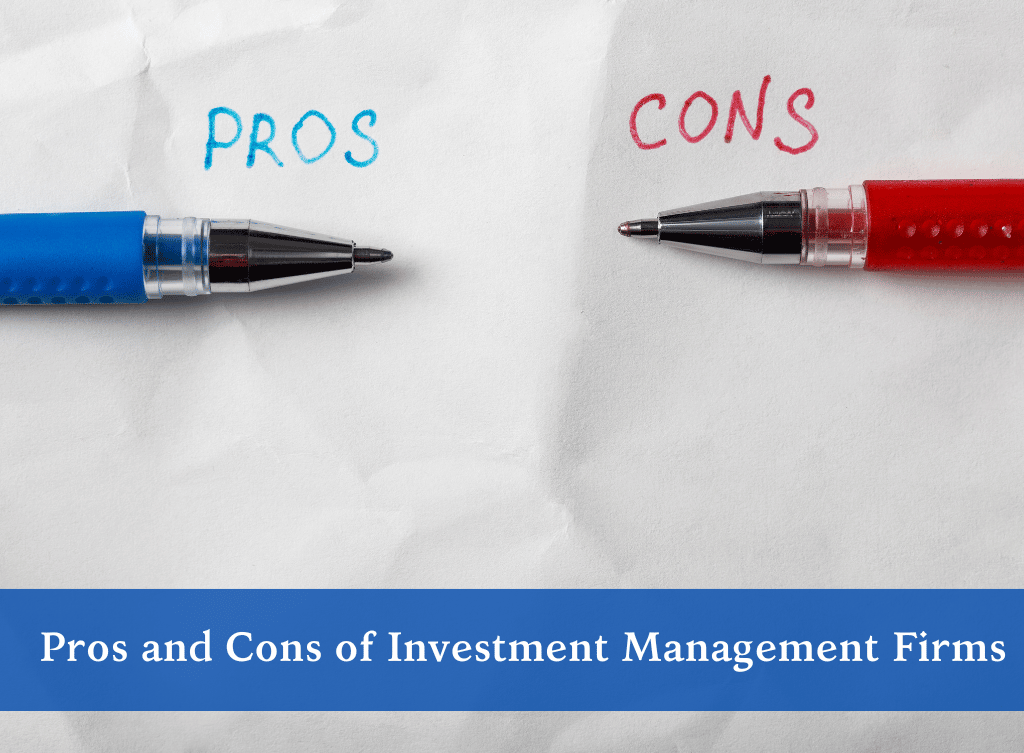Investment Firms
Accumulating significant wealth is rarely simple. It often requires decades of disciplined work, strategic planning, and smart financial decisions. Once you have built a high net worth portfolio—whether a few million dollars or more—your focus typically shifts toward not only growing that wealth steadily but also preserving it through market fluctuations. Independent investment firms specialize in helping individuals and families manage and expand their asset portfolios with a long-term perspective.
Managing wealth is a full-time responsibility. While there are DIY options, discount brokers, and robo-advisory platforms available, high-net-worth and ultra-high-net-worth portfolios often require a customized approach that only an experienced investment management firm can provide.
Some clients may prioritize lower fees or more transparency when selecting an advisor, while others focus on achieving the strongest possible long-term performance aligned with their financial objectives.
Navigating decisions around stocks, bonds, commodities, and other asset classes requires deep market knowledge and an understanding of how broader economic cycles influence investment opportunities. Investing always carries risk—returns can fluctuate significantly based on timing, strategy, and market conditions.
Moreover, managing a portfolio is about more than just annual rates of return. It also involves considering taxes, fees, risk exposure, estate planning, and other critical financial factors that impact your total net outcome over time.
In this article, we will explore how to define your investment objectives, why working with an independent investment firm may be beneficial, the advantages and limitations of various investment management approaches, and the key qualities to look for in selecting the best investment firms for high-net-worth individuals.
Table of Contents
What Is an Investment Company?
An investment company is a business entity—such as a corporation, partnership, or limited liability company—that primarily engages in investing and issuing securities. In the United States, investment companies are registered and regulated by the Securities and Exchange Commission (SEC).
The core function of an investment company is to collect money from clients and pool those funds to invest in a variety of securities. Clients then share in the profits or losses generated by the investment portfolio. In addition to securities, investment companies may also buy, sell, and manage property, cash, and other types of financial assets.
Understanding Investment Companies
There are three primary types of investment companies: mutual funds (known as open-end companies), closed-end funds, and unit investment trusts (UITs).
Shares of mutual funds and UITs are redeemable, meaning they can typically be sold back to the fund or through a broker acting on behalf of the fund. In contrast, shares of closed-end funds are not redeemable; they must be sold to other investors on a secondary market.
Closed-end funds raise capital through an initial public offering (IPO) and invest the proceeds in a portfolio of stocks, bonds, and other securities. They issue a fixed number of shares, which are then traded on stock exchanges such as NASDAQ.
Unit investment trusts (UITs) usually offer a one-time public offering of a set number of securities. Some UITs operate secondary markets, but they are designed to terminate on a specific date established at the time of creation.
Exchange-traded funds (ETFs) are not mutual funds, although they are often structured similarly to open-end funds or sometimes as UITs.
Mutual funds can be categorized into stock funds, bond funds, and money market funds. Index funds, which aim to replicate the performance of a specific market index, can be structured as either mutual funds or UITs.
The assets of a fund are managed by a fund manager who applies either active or passive investment strategies. The fund manager is responsible for executing the fund’s investment strategy, managing trades, and making decisions based on in-depth research and analysis of companies and market conditions. The manager’s expertise can significantly influence the fund’s overall performance.

Why Choose Investment Management Firms?
The rise of technology and fintech has made investing easier than ever. Today, anyone can invest by tapping a few buttons on their smartphone, bringing the world of investments to the palm of their hand.
However, successful investing goes far beyond simply picking a stock or mutual fund. It requires careful thought about where and how capital should be allocated, and an understanding of what types of investments to avoid based on personal goals and risk tolerance. Investing should always be done with a purpose—it is a tool to help achieve your broader financial and life objectives.
Investment decisions are also deeply influenced by your individual circumstances, including your lifestyle, motivations, and current financial standing. For example, someone whose primary financial goals are decades away can often afford to pursue higher-risk investments to target greater returns. In contrast, someone nearing retirement in a few years would require a more conservative approach to preserve their wealth.
Financial goals can vary widely. One person may aspire to retire to a dream property in a warm climate, while another might prioritize starting a business, purchasing a yacht, or funding a child’s education at an Ivy League institution. The financial plans and cash flow requirements for these goals differ significantly, influencing the structure and management of their investment portfolios.
Investment management firms specialize in providing professional, holistic support tailored to these unique needs. Experienced firms not only manage investments but also optimize tax strategies, align cash flows with life milestones, and help connect financial objectives directly to investment decisions.
Choosing to work with an investment management firm is about more than managing assets—it’s about mitigating risk in portfolios where the stakes are high. Larger portfolios require precise, informed decision-making, as even minor mistakes can result in significant financial losses.
When referring to investment management firms, it includes a broad range of professionals—not just hedge funds or portfolio managers, but also experts who offer integrated solutions covering all aspects of wealth management for high-net-worth individuals.

Understanding Your Investment Goals
Understanding your investment goals is a critical first step before evaluating investment management firms. After all, the purpose of investing is to help you achieve your life objectives. A well-defined investment goal should be specific, measurable, and aligned with your long-term financial aspirations.
One of the best ways to start is by listing the milestones you want to reach in the short, medium, and long term. Short-term goals might include building an emergency fund or purchasing insurance to manage risk. Medium-term goals could involve getting married, starting a business, or buying a home. Long-term goals often include retirement planning, purchasing a second property, embarking on global travel, or philanthropic giving.
You can organize these goals based on your intended time frame for achievement. Goals you expect to accomplish within one year are considered short-term. Those that fall within two to five years are medium-term, while goals expected to take five years or more are categorized as long-term.
After identifying your goals, the next step is to estimate the financial resources needed to achieve each one. Larger goals, such as retirement, typically require more significant funding compared to smaller goals like building an emergency reserve. Assigning a dollar amount to each goal makes it measurable and actionable.
It is also important to think about your wealth transfer plans. Consider how much of your assets you intend to spend during your lifetime and how much you would like to pass on to the next generation. Quantifying your legacy goals helps create a more comprehensive investment strategy.
Establishing your investment objectives as early as possible provides more time and flexibility to fine-tune your plan. Early planning expands the range of investment options available to you, whereas delayed planning can limit opportunities and make certain financial goals more challenging to achieve.
The sooner you begin defining and prioritizing your investment goals, the better positioned you will be to build and protect lasting wealth.

Pros and Cons of Investment Management Firms
As an investor, it is important to carefully evaluate the pros and cons of working with investment management firms. Doing so can help you decide whether partnering with a firm is the right choice for your financial needs, and can also assist you in shortlisting the best investment firms from a pool of potential candidates.
Pros
One of the primary advantages of working with an investment management firm is having a dedicated wealth advisor. Instead of navigating multiple contacts for different services, you typically work with one advisor who understands your financial goals, your family’s circumstances, and your long-term objectives. A dedicated advisor also provides regular updates and serves as a consistent point of contact for any questions you may have.
Building a relationship of trust is essential when managing significant wealth, and having a single advisor fosters that connection.
Another benefit is the expertise that experienced investment management professionals bring. Advisors are often highly knowledgeable about a wide range of financial instruments, including stocks, bonds, exchange-traded funds (ETFs), and index funds. Their experience enables them to make informed decisions regarding asset allocation, rebalancing strategies, and cost management—factors that can significantly impact long-term portfolio performance.
Controlling investment costs is a critical but often overlooked aspect of effective portfolio management. A skilled advisor will prioritize strategies that help manage and minimize expenses over time.
Cons
While investment management firms offer many benefits, there are potential pitfalls to be aware of when selecting a firm.
First, it is essential to understand a firm’s fee structure. Two common models are fee-only and fee-based. Fee-only advisors are compensated solely through client fees, which tends to reduce conflicts of interest. In contrast, fee-based models may include both client fees and commissions from financial products, which can introduce potential biases in the recommendations you receive.
Second, it is important to verify whether the investment firm uses an independent custodian to hold your assets. A custodian, such as a brokerage firm or an asset management institution, safeguards your investments independently of the advisory firm. Having an independent custodian minimizes the risk of conflicts of interest and ensures that your assets are securely and transparently held.
Carefully weighing the pros and cons can help you make an informed decision about choosing an investment management firm that aligns with your financial priorities and expectations.

Finding the Best Investment Management Firms and a Human Financial Advisor
The best wealth management and investment management firms are those that help clients achieve their financial objectives through tailored strategies. Choosing the right investment advisor can impact everything from your estate planning and retirement preparation to your broader financial plan.
The firm you select might be a large, nationally recognized brand or a smaller, highly personalized independent service. In many cases, the brand name itself matters less than the quality of service. Larger firms may sometimes take a more standardized, volume-driven approach, investing client portfolios into a few preset funds without deeply considering individual needs.
By contrast, a highly skilled investment management firm prioritizes quality over quantity, focusing on truly understanding each client’s goals and designing portfolios that reflect their unique circumstances.
Another important consideration is portfolio management strategy. Some firms move client funds frequently in pursuit of short-term gains without accounting for the impacts of short-term capital gains taxes and transaction fees. Effective investment management firms weigh these costs carefully before making decisions, ensuring that strategies are optimized for both returns and tax efficiency.
Ongoing portfolio monitoring is also crucial. Investing is not a one-time decision but a dynamic process that requires continual oversight. Effective firms consistently stress-test client portfolios, regularly reassess financial goals, and provide transparent updates to their clients.
Furthermore, the best investment firms take the time to listen. By deeply understanding each client’s motivations, lifestyle, and long-term objectives, they can build genuinely customized investment strategies that reflect each individual’s values and aspirations.
Large national firms like Fidelity, Vanguard, or Schwab may offer broad services, but personalized attention is often better achieved with independent investment firms that focus on client depth rather than volume. Choosing the right partner can make all the difference in successfully managing and growing significant wealth.
If you’re ready to move forward and find the right firm that aligns with your unique goals, you can take the next step through any of our helpful engines:
Take control of your financial future by connecting with professionals who can help you build a path toward your goals today.
